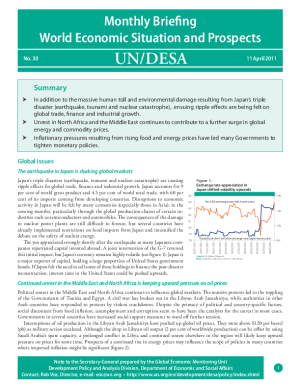April 2011
Summary:
- In addition to the massive human toll and environmental damage resulting from Japan?s triple?disaster (earthquake, tsunami and nuclear catastrophe), ensuing ripple effects are being felt on?global trade, finance and industrial growth
- Unrest in North Africa and the Middle East continues to contribute to a further surge in global?energy and commodity prices
- Inflationary pressures resulting from rising food and energy prices have led many Governments to?tighten monetary policies
Japan?s triple disasters (earthquake, tsunami and nuclear catastrophe) are causing?ripple effects for global trade, finance and industrial growth. Japan accounts for 9?per cent of world gross product and 4.5 per cent of world total trade, with 60 per?cent of its imports coming from developing countries. Disruptions to economic?activity in Japan will be felt by many economies (especially those in Asia), in the?coming months, particularly through the global production chains of certain industries such as semiconductors and automobiles. The consequences of the damage?to nuclear power plants are still difficult to foresee, but several countries have?already implemented restrictions on food imports from Japan and intensified the?debate on the safety of nuclear energy.
?
 Welcome to the United Nations
Welcome to the United Nations
